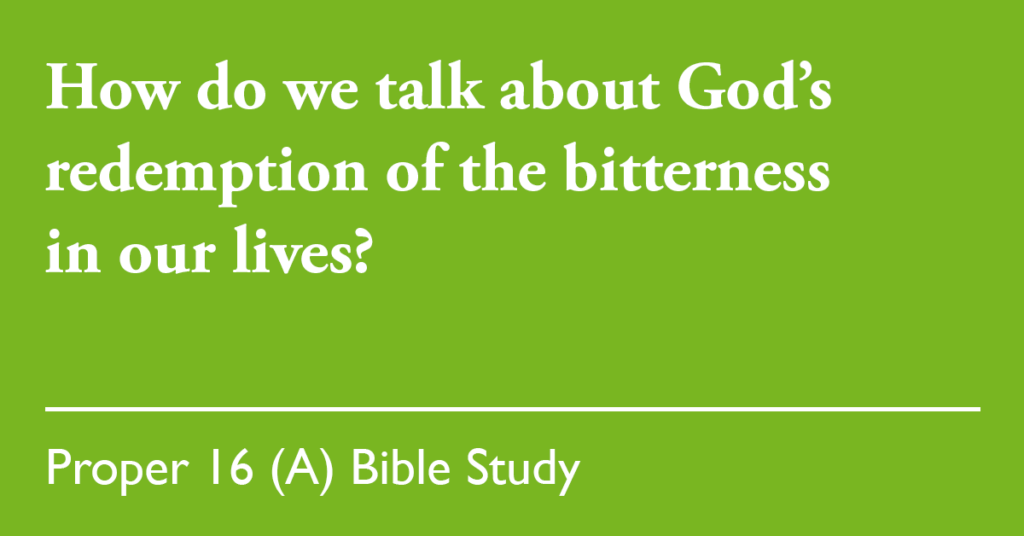Bible Study: Proper 16 (A) – 2023
August 27, 2023
RCL: Exodus 1:8-2:10; Psalm 124; Romans 12:1-8; Matthew 16:13-20

Exodus 1:8-2:10
We enter this reading on the on the happy note of how God saved Israel from hunger through Joseph and enter the story of why Egypt did not remain the home of the fruitful and strong nation. If the nation could have been lost in Joseph’s story by betrayal of brothers, then this story is about the betrayal by others, neighbors really. The death of every boy would also leave mothers and sisters without clans to protect and appeal for them. The women have their own means of resistance to oppression. We see honor given to the nervy midwives, Shiphrah and Puah. Their names are recorded while the Egyptian princess remains unnamed. This time, God would use another son, Moses, lost in Egypt, drawn up from the water (instead of a well) to save his people.
- How do we talk about God’s redemption of the bitterness in our lives?
- The communion of saints includes the named and unnamed. Are you more comfortable with those whose lives have been recorded or those known only to a few?
Psalm 124
This psalm recounts God’s extraordinary acts to aid the escape of the whole people of Israel. It is meant to comfort the individual in times of trouble and may have been recited by pilgrims headed to Jerusalem. It is a fitting complement to the Exodus story and it is easy to imagine the Israelites telling similar stories as they walked in the wilderness. There are repeating phrases in this psalm, such as “If it had not been the Lord who was on our side,” for poetic emphasis and to aid in recollection. This repetition is common in Hebrew poetry. The phrases that begin with “then” are meant to build on each other. The climactic declaration “Our help is in the name of the Lord” is the thanksgiving for Israel’s deliverance and ours.
- Escape is a common biblical theme but not one we speak of often in contemporary culture. Reflect on escape. Did you feel God’s presence more acutely after an escape?
- What does the name “Maker of heaven and earth” mean to you? Does that image make God seem nearer or farther from your circumstances? Are you comforted by your understanding of God’s intimacy or holiness?
Romans 12:1-8
This is one of the most beloved passages in the New Testament for its egalitarianism and accessible imagery. It begins Paul’s instruction on Christian community that contrasts our bodies, which stand for our entire selves, with the community as a body. He calls for faithful, sober, and wholesome living (often translated as “perfect”) in contrast to the passions in Romans 1:18-32. Paul supports an austere, communal life with times of ecstatic prayer but was not a believer in marriage and family life.
- What social structures and practices support Paul’s exhortation for faithful, sober and wholesome living today?
- How do we reconcile his image of the church as one body with a variety of household types?
Matthew 16:13-20
This passage is a climax for Jesus’ teaching, healing, and feeding in Matthew. The Pharisees and Sadducees want yet another sign at the beginning of the chapter, but ordinary Peter is confident that Jesus is the Messiah.
Peter receives honor in each of the gospels, but in Matthew, there is a direct reference to the Church. There is no Church without the confession of Jesus as the promised Messiah, and even at this moment, the Church is in conflict with “gates of Hades” (NRSV). Further, the Church is aggressive against the gates of hell, entrusted with authority and ultimately victorious. It is done. Death is permanently defeated but continues to terrorize and deceive unaware souls. Fear of death is not the same as death.
- Is confession of Jesus as Messiah an aggressive statement in your community or more customary?
- In your spiritual imagination, what do you understand to be Peter’s keys?
¡No olvide suscribirse al podcast Sermons That Work para escuchar este sermón y más en su aplicación de podcasting favorita! Las grabaciones se publican el jueves antes de cada fecha litúrgica.


